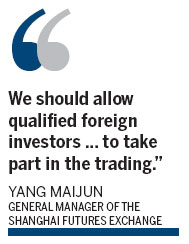Shanghai Futures Exchange expected to add after-hours trading this year
Updated: 2013-03-06 07:50
By He Wei (China Daily)
|
||||||||
The Shanghai Futures Exchange, the country's leading commodities market, is expected to launch after-hours trading before the end of the year, in a critical step to gain a foothold in global futures trading.
The exchange will further boost its international ambitions by expanding the list of futures contracts in the coming years, including crude oil - one of the world's most important commodities - said Yang Maijun, general manager of the exchange.
"We are actively making preparations and hope to roll out night trading this year," Yang, a national legislator from Shanghai, said on the sidelines of the first session of the 12th National People's Congress.
The exchange now trades from 9 am to 11:30 am and from 1:30 pm to 3 pm Beijing time. The extended trading hours will bridge the gap between domestic investors and foreign markets, and will align the exchange with international practices, Yang said.
The move will allow market participants to hedge and adjust their positions after breaking news emerges in the United States or Europe, thus reducing price volatility, said Li Ning, a futures researcher in Shanghai.
And as Shanghai is on course to become an international financial center, after-hours trading will also help boost demand for the renminbi in the global market, Li added.
Yang said that China is also positioning its futures markets to become major players, and shape the global prices for metals, energy and farm commodities. This will give Chinese traders a direct role in valuing the contracts, and will help the country to be less at the mercy of markets elsewhere.

China is a heavy user of industrial and agricultural commodities, such as oil, copper and aluminum. But with an isolated futures market, the country has little say over global prices.
To change things, China needs to diversify its futures portfolio and make the market more transparent, Yang noted.
In January, the exchange performed a test run of its international trading platform to make it technically eligible to trade foreign currency and renminbi.
"We should allow qualified foreign investors, notably institutional investors and corporate clients, to take part in the trading," Yang said.
The country's securities regulator, the China Securities Regulatory Commission, has given foreign investors limited access to the futures market. To access the market, foreign investors should hold a stake of less than 5 percent in a domestic futures brokerage through a Chinese legal entity.
Yang said that the legislation process of the country's futures contract law should be quickened so as to regulate the market and protect investors' rights.
"The law will help the development and improvement of trading categories, trading volumes and investor structure. After a 20-year experience, China's futures market is mature enough to handle things within a legal framework," he said.
The Shanghai Futures Exchange has 10 trading categories, including gold, silver, copper and aluminum.
Aside from the Shanghai exchange, China has three other commodities bourses: the Dalian Commodity Exchange in Liaoning province, the Zhengzhou Commodity Exchange in Henan province, and the China Financial Futures Exchange in Shanghai.
hewei@chinadaily.com.cn
(China Daily 03/06/2013 page13)

 In Photos: 7.0-magnitude quake hits Sichuan
In Photos: 7.0-magnitude quake hits Sichuan
 Li Na on Time cover, makes influential 100 list
Li Na on Time cover, makes influential 100 list
 FBI releases photos of 2 Boston bombings suspects
FBI releases photos of 2 Boston bombings suspects
 World's wackiest hairstyles
World's wackiest hairstyles
 Sandstorms strike Northwest China
Sandstorms strike Northwest China
 Never-seen photos of Madonna on display
Never-seen photos of Madonna on display
 H7N9 outbreak linked to waterfowl migration
H7N9 outbreak linked to waterfowl migration
 Dozens feared dead in Texas plant blast
Dozens feared dead in Texas plant blast
Most Viewed
Editor's Picks

|

|

|

|

|

|
Today's Top News
Live report: 7.0-magnitude quake hits Sichuan, heavy casualties feared
Boston suspect cornered on boat
Cross-talk artist helps to spread the word
'Green' awareness levels drop in Beijing
Palace Museum spruces up
First couple on Time's list of most influential
H7N9 flu transmission studied
Trading channels 'need to broaden'
US Weekly

|

|







